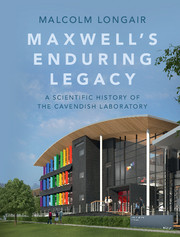Book contents
- Frontmatter
- Dedication
- Contents
- Preface
- Acknowledgements
- Part I To 1874
- Part II 1874 to 1879
- Part III 1879 to 1884
- Part IV 1884 to 1919
- 5 The challenges facing J.J. Thomson
- 6 The Thomson era, 1884–1900: the electron
- 7 The Thomson era, 1900–1919: atomic structure
- Part V 1919 to 1937
- Part VI 1938 to 1953
- Part VII 1953 to 1971
- Part VIII 1971 to 1982
- Part IX 1984 to 1995
- Part X 1995 to present
- Appendix The evolution of the New Museums site
- Notes
- References
- Author index
- Subject index
7 - The Thomson era, 1900–1919: atomic structure
from Part IV - 1884 to 1919
Published online by Cambridge University Press: 05 July 2016
- Frontmatter
- Dedication
- Contents
- Preface
- Acknowledgements
- Part I To 1874
- Part II 1874 to 1879
- Part III 1879 to 1884
- Part IV 1884 to 1919
- 5 The challenges facing J.J. Thomson
- 6 The Thomson era, 1884–1900: the electron
- 7 The Thomson era, 1900–1919: atomic structure
- Part V 1919 to 1937
- Part VI 1938 to 1953
- Part VII 1953 to 1971
- Part VIII 1971 to 1982
- Part IX 1984 to 1995
- Part X 1995 to present
- Appendix The evolution of the New Museums site
- Notes
- References
- Author index
- Subject index
Summary
During the second half of Thomson's long tenure as Cavendish Professor until he stood down in 1919, research centred largely on the problems of atomic structure from the experimental perspective. The names which were to feature most prominently included Charles Barkla, Charles (C.T.R.)Wilson, W. Lawrence Bragg, Geoffrey Taylor and Francis Aston. A long shadow was cast by the remarkable researches of Thomson's former student Ernest Rutherford and his colleagues, first at McGill University in Montreal, Canada from 1998 to 1907, and then from 1907 until 1919 at Manchester where Rutherford was Langworthy Professor of Physics. In 1919 he succeeded Thomson as Cavendish Professor.
It was during the period 1900 to 1919 that the hallmarks of twentieth-century physics were indelibly etched into its infrastructure with the discoveries of the special and general theories of relativity by Albert Einstein and the recognition of the key role of quantisation at the atomic level by Planck, Einstein, Bohr and many others. It was a period when it gradually became apparent that classical physics was no longer adequate to account for physical phenomena at the atomic level, but there was no coherent quantum theory to replace classical physics. Intriguingly, the ferment of continental physics and theoretical physics had relatively little impact upon the experimental programme of the Laboratory, which continued the tradition of carrying out ingenious experiments and model-building, which informed the deliberations of the theorists.
The problems of buildingmodels of atoms
Thomson summarised the researches which led to his discovery of the electron and its universality in his influential book Conduction of Electricity through Gases (Thomson, 1903a). As he wrote in the introduction:
The study of the electrical properties of gases seems to offer the most promising field for investigating the Nature of Electricity and the Constitution of Matter, for thanks to the Kinetic Theory of Gases our conceptions of the processes other than electrical which occur in gases are much more vivid and definite than they are for liquids or solids; in consequence of this the subject has advanced very rapidly and I think it may now fairly be claimed that our knowledge of and insight into the processes going on when electricity passes through a gas is greater than it is in the case either of solids or liquids.
- Type
- Chapter
- Information
- Maxwell's Enduring LegacyA Scientific History of the Cavendish Laboratory, pp. 139 - 168Publisher: Cambridge University PressPrint publication year: 2016



